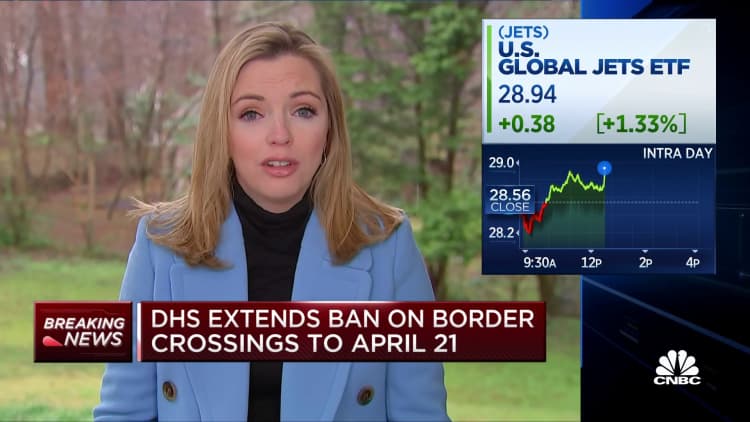
The Biden administration is looking toward the middle of May to relax restrictions on travel across the borders with Mexico and Canada and on inbound international travel from the U.K., Europe and Brazil, according to two sources familiar with the matter.
While there has not been a policy memo or formal codification of that time frame, the discussion has focused on trying to limit the spread of variants domestically as localities make their own decisions on how quickly to reopen. In the meantime, officials have suggested President Joe Biden and his Covid task force need more time to feel comfortable with reopening borders and increasing the level of air traffic from overseas.
"There is going to be a sea change in mid-May when vaccines are more widely available to everyone," according to one senior administration official.
The sources spoke on condition of anonymity because they were not authorized to speak publicly.
The White House did not respond to e-mail requests for comment before publication.
The Department of Homeland Security announced a one-month extension of a ban on land crossings at the borders with Canada and Mexico until April 21. The previous expirations, renewed a month ago, had been set to expire March 21.
The Biden administration has been grappling with a surge in migration at the southern border, with the volume of unaccompanied minors overwhelming shelters and the number of adults apprehended set to reach 20-year highs. The U.S. has been pressing Mexico to do more to control the flow of migration — in addition to enforcing testing and masking protocol to limit Covid spread.
At the northern border, one official said, Canada has been requesting the U.S. keep the border closed until citizens there can get access to vaccines. In a joint communique following a bilateral meeting in late February, Biden and Prime Minister Justin Trudeau said they "agreed to take a coordinated approach based on science and public health criteria when considering measures to ease Canada-U.S. border restrictions in the future."
As for international air travel from Britain, Europe and Brazil, interagency working groups in the Biden administration have agreed to revisit the issue on a weekly basis as new data becomes available. Public health experts have raised concerns about new variants that could spread rapidly in communities that are reopening quickly, while other officials have noted that all international travelers must test negative before boarding. Those two views, according to sources, have offset each other in deliberations.
Before leaving office, former President Donald Trump lifted restrictions on inbound travel from allied countries, even as the United States was experiencing a surge in cases, hospitalizations and deaths. Biden reinstated the restrictions during his first week in office.
"With the pandemic worsening, and more contagious variants emerging around the world, this is not the time to be lifting restrictions on international travel," press secretary Jen Psaki tweeted on Jan. 25 when the administration moved to reinstate the limits.

